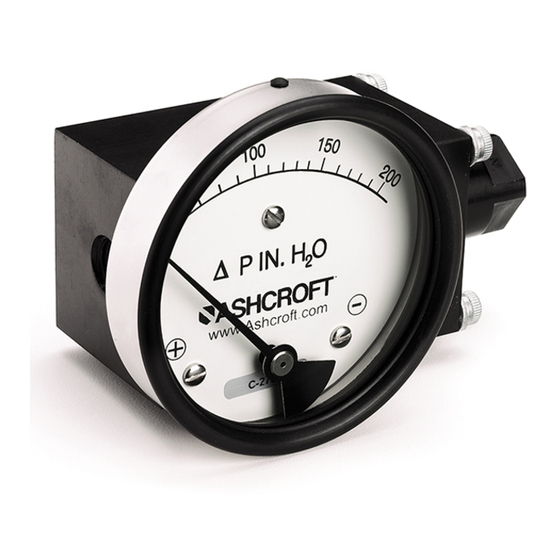Ashcroft 1132 Instrukcje instalacji
Przeglądaj online lub pobierz pdf Instrukcje instalacji dla Przyrządy pomiarowe Ashcroft 1132. Ashcroft 1132 2 stron. Differential pressure gauge/switch

Installation Instructions for
ASHCROFT
®
Model 1132
Differential Pressure Gauge/Switch
REED SWITCH (OPTIONAL)
POINTER
HIGH
MAGNET
ROTARY MAGNET
Small Convoluted Diaphragm
For efficient working of your gauge, please read all instructions
carefully before attempting to install.
CAUTION: Do not exceed maximum operating pressure given
on the gauge label. Check fluid compatibility with wetted parts
before use.
OPERATING PRINCIPLE
High and Low pressures are separated by a sensor assembly
consisting of a magnet, diaphragm and a range spring. The
difference in pressure causes the sensor assembly to move in
proportion to the change against a range spring.
A rotary magnet, located in a separate body compartment and
isolated from the acting pressures is rotated by a magnetic
coupling following the linear movement of the sensor assembly.
A pointer attached to the rotary magnet indicates differential
pressure on the dial.
SWITCH: Reed switches (optional) are located adjacent to the
pressure chamber and are activated by the magnetic field of
the sensor assembly.
Note: The gauges are calibrated to give ±2% full scale accura-
cy on ascending readings.
INSTALLATION
For better performance the gauge should be mounted horizon-
tally with the dial vertical. Depressurize the system and con-
nect the high and low pressure lines of your system to the
"High" and "Low " ports of the gauge, respectively.
It is recommended to use "O" rings with male connectors to
avoid excessive tightening and to prevent leakage (for parallel
threads). The gauge is now ready for operation. Apply "High"
and "Low " pressures simultaneously, to avoid damage to the
internal parts.
Model 1132 consists of a small convoluted diaphragm to
sense the pressure difference. It can withstand maximum
operating pressure up to 1500 psi for all ranges. If pressure
exceeds the rated maximum pressure, "O" rings and
diaphragm inside the pressure chamber, will be damaged. If
maximum operating pressure is within the allowable limit of
1500 psi, but the differential pressure exceeds gauge range,
there will be no damage to the gauge. The pointer will only go
to the extreme right end of the scale.
© Ashcroft Inc., 250 East Main Street, Stratford, CT 06614-5145, USA, Tel: 203-378-8281, Fax: 203-385-0357, www.ashcroft.com
All sales subject to standard terms and conditions of sale. I&M008-10087-11/01 AMR 2C09/09
RANGE SPRING
CONVOLUTED DIAPHRAGM
Model 1132
PRECAUTIONS
Do not connect "High" and "Low" ports to the wrong pipe ends.
Do not subject the gauge to excessive vibration. The gauge is
never to be used in an area where a magnetic field is present.
It may show the wrong readings.
As the gauge works on a magnetic coupling principle, use only
non-magnetic fittings, parts, etc. in areas closer than 2˝ on all
sides, otherwise calibration will be affected. Panel mounted
LOW
gauges should be installed in non-ferrous panel material.
However, gauges with 2˝ and 2.5˝ dials, mounted in steel
panels, may require pointer adjustment. This is done by the
manufacturer, upon request.
Do not try to open any part of the gauge for any reason, be-
cause if not reassembled properly calibration will be affected.
SWITCH SETTING
Please follow these instructions when your differential pressure
gauges are supplied with a switch. The switches are normally
factory set to save the customer time. However, they are field
adjustable.
CAUTION: Supply voltage should not exceed switch rating. For
higher supply, use of relay circuit is recommended.
SWITCH ADJUSTMENT
The following procedure must be done by putting the gauge on
test bench or while in actual service. The switch adjustment
screw is located on the plastic cover. Rotate the screw counter
clockwise to increase the setpoint and clockwise to decrease
the setpoint. One or two trials may be necessary to attain the
exact setpoint.
Increase setpoint
counter clockwise
View from high pressure side
